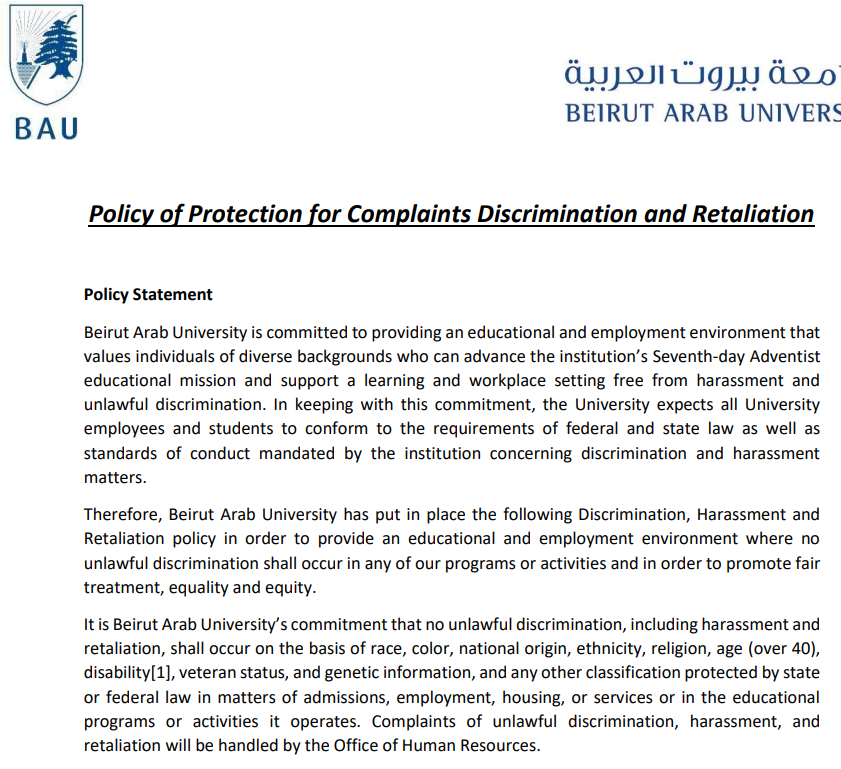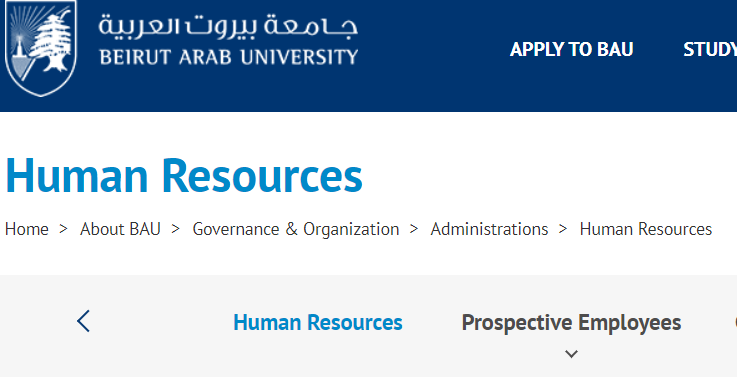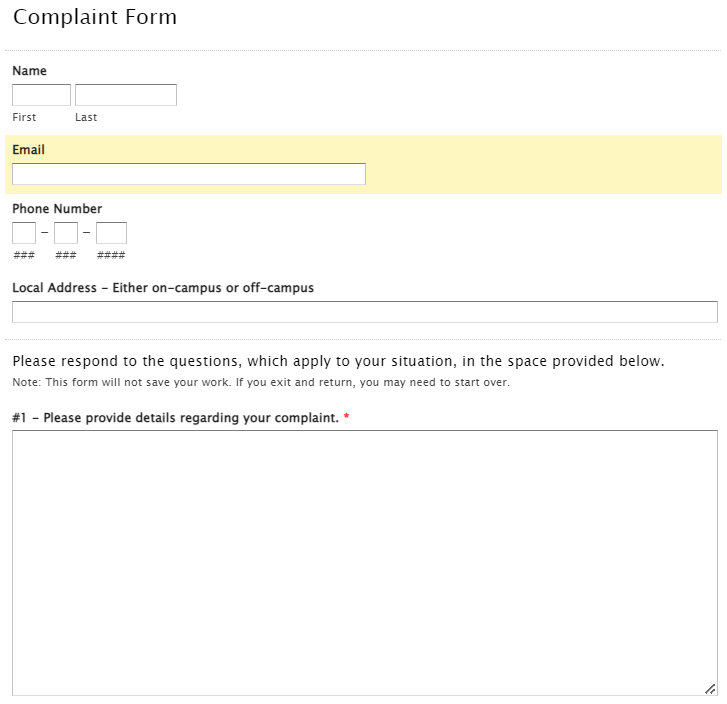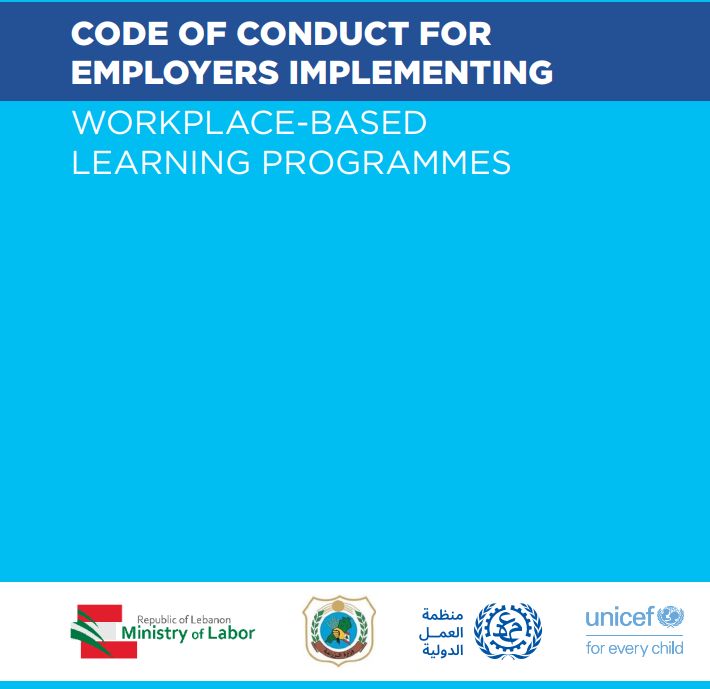Policy that protects those reporting discrimination from education or employment disadvantage
Policy of Protection for Complaints Discrimination and Retaliation - Policy Statement
Beirut Arab University is committed to providing an educational and employment environment that values individuals of diverse backgrounds who can advance the institution’s Seventh-day Adventist educational mission and support a learning and workplace setting free from harassment and unlawful discrimination. In keeping with this commitment, the University expects all University employees and students to conform to the requirements of federal and state law as well as standards of conduct mandated by the institution concerning discrimination and harassment matters.
Therefore, Beirut Arab University has put in place the following Discrimination, Harassment and Retaliation policy in order to provide an educational and employment environment where no unlawful discrimination shall occur in any of our programs or activities and in order to promote fair treatment, equality and equity.
It is Beirut Arab University’s commitment that no unlawful discrimination, including harassment and retaliation, shall occur on the basis of race, color, national origin, ethnicity, religion, age (over 40), disability, veteran status, and genetic information, and any other classification protected by state or federal law in matters of admissions, employment, housing, or services or in the educational programs or activities it operates. Complaints of unlawful discrimination, harassment, and retaliation will be handled by the Office of Human Resources.
All employees, students and affiliated third parties are expected to assume responsibility for maintaining a work and learning environment that is free from unlawful discrimination, harassment and retaliation. The University encourages individuals subjected to or who witness any form of unlawful discrimination and harassment or retaliatory conduct arising from complaints that violate this policy – to promptly report such behaviors and incidents to their supervisor and or the Office of Human Resources, so that the conduct can be addressed and resolved immediately. Supervisors are required to promptly report conduct that violates this policy to the Office of Human Resources. The Office of Human Resources is committed to responding to alleged violations of this policy in a timely and fair manner and to taking appropriate action aimed at ending the prohibited conduct.
The University also prohibits unlawful discrimination, harassment, and retaliation on the basis of sex and gender. The policy and procedures for complaints involving sexual harassment, sexual discrimination, sexual assault, stalking, dating and domestic violence and retaliation are described in the Title IX Sexual Harassment/Sexual Misconduct Policy and are handled by the Title IX Office. If the Title IX Office receives a complaint not related to discrimination and harassment based on sex and gender, it will refer the case to the Office of Human Resources for further investigation. Similarly, if the Human Resources Office receives a complaint that is related to sex and gender, it will refer the case to the Title IX Office for further investigation.
Policy of Protection for Complaints Discrimination and Retaliation - Applicability
This policy applies to all members of the Beirut Arab University community, including students, employees and affiliated third parties.
For the purposes of this policy, employees include temporary employees, student employees, part-time and full-time faculty, adjunct instructors, and all members of Beirut Arab University staff.
Affiliated third parties may include, but are not limited to, independent contractors, volunteers who perform work for the University, vendors, alumni, and guests or visitors to the University.
This policy pertains to acts of prohibited conduct committed by or against students, employees, and third parties when:
the conduct occurs on the campus or other property owned or controlled by the University.
the conduct occurs in the course of university-related business travel or off- campus programs, such as (but not limited to) domestic or international academic programs, field trips, study abroad, internship, work-related conferences, etc.
This policy also applies to behavior conducted online, including via email. Postings on blogs, web pages, social media sites, and other similar online postings can subject an individual or group to allegations of violations of this policy. The University does not regularly search for this information, but action may be taken by the University if and when such information is brought to the attention of the University.
Policy of Protection for Complaints Discrimination and Retaliation - Members of the University community have the right to:
a work and academic environment free from unlawful discrimination, harassment and retaliation.
file a complaint of discrimination, harassment or retaliation. Individuals are encouraged to report inappropriate conduct immediately and, whenever possible, to put the complaint or concern in writing.
a full, impartial and prompt investigation into allegations of conduct that would violate this polic
be timely informed of appropriate information related to the outcome of an investigation either as a complainant or a respondent in the investigation.
be free from retaliation or reprisal after filing a complaint or participating in the complaint process.
file a complaint directly with the federal Equal Employment Opportunity Commission or other appropriate state or federal agencies.
Policy of Protection for Complaints Discrimination and Retaliation - Retaliation
As used in this policy, retaliation is defined as any adverse action taken against an individual for reporting, providing information, exercising one’s rights or responsibilities under this policy, or otherwise being involved in the process of responding to, investigating, or addressing allegations of discrimination and harassment. Retaliatory actions, such as intimidation, threats, or coercion against any individual for having engaged in the above actions, will be addressed by the Office of Human Resources. Individuals who engage in the actions discussed in this section are subject to disciplinary action that may include, but are not limited to, written warnings, suspension, termination of employment, exclusion, expulsion, or dismissal from the University.
Anyone who is aware of possible retaliation, or has other concerns regarding the response to a discrimination and or harassment complaint, should report such concerns to the Office of Human Resources who will ensure that the matter is investigated, as well as take appropriate actions in a fair and impartial manner.
Retaliation claims on the basis of sex and gender fall under the scope of the Title IX Office and should be reported to the Title IX Coordinator.
Policy of Protection for Complaints Discrimination and Retaliation - Confidentiality
The University will treat inquiries and complaints about prohibited discrimination, harassment, or retaliation as confidential to the extent possible, in accordance with the complaint procedures referenced herein. In some circumstances, the University may be required to act on information it has received even if the person providing the information chooses not to pursue a complaint.
The Human Resources (HR) Department strives to maintain a great work experience for employees at BAU through supporting them in various aspects. Our programs and services are designed to inspire performance and achievement at the highest level. The flexible and supportive work environment that we create nurtures the development of employee’s skills.
Vision
The HR Department aspires to provide highly flexible administrative services to employees. We work to attract, develop, motivate, and retain a diverse workforce; we aim to maintain international accreditation standards in all aspects of our performance and to provide an outstanding and exceptional work experience to employees.
Mission
The HR Department’s mission is to recruit highly qualified academic and administrative staff at BAU. We train employees to develop their productivity, performance, and creativity. We plan and develop initiatives in line with the objectives of BAU. Our aim is to support diversity and nurture development of employees.
To facilitate a confidential report about a case of discrimination or harassment suffered by any member of the University, whether a student or staff of the University, I created an "Online Complaint Form", where the student or staff member can make a complaint with complete confidentiality. Upon receiving
the complaint form, the University will contact the person to provide the necessary resources and support to deal with the situation, and BAU will also carry out the proper investigation to verify the facts.
Code of Conduct for Employers Implementing Work-place based Learning Programs
This Code of Conduct is a guidance note to employers engaged in workplace-based learning programs that describes the standards that employers should meet to ensure a safe learning environment for trainees that respects human rights and labor rights.
Its articles reflect national labor law and related regulations, international conventions Lebanon has ratified, core labor standards that apply to all ILO member states, and international good practices.
The Code of Conduct will also support training providers involved in designing and developing such programs, and trainees themselves, to gain a better understanding of the ethics and protection measures that employer should observe throughout workplace-based learning programs.
Employers implementing a workplace-based learning or on the job training program should make all possible efforts to ensure that all provisions of the labor law and related regulations are implemented in full, and to create an environment for the trainees/interns1 that can stimulate innovation and support the development of their competencies. Workplace-based learning is expected to be a mutually beneficial experience– as the employers will be able to source the skills and talents they need for their companies, and trainees will acquire market relevant skills.
Core Labor Standards and Protection from Harassment
The employer will avoid any distinction, exclusion or preference of trainees made on the basis of race, color, sex, religion, political opinion, sexual orientation, disability, national extraction or social origin, which has the effect of nullifying or impairing equality of opportunity or treatment when trainees are recruited and when they progress through their workplace-based learning experience.
The employer will also ensure the reasonable accommodation of the needs of the trainees with disabilities and learning difficulties in order to ensure they fully participate in the internship, and benefit from it in the same way than other trainees2. The employer will not force the trainees outside the framework of the training to accomplish a task against their will, and will not use threats of penalties for them to implement these tasks.
The employer will not recruit children’s trainees below the minimum age for employment, and will provide a safe working environment to all, with targeted occupational safety and health measures for all children above the minimum age of employment. The employer will refrain from assigning any type of harmful tasks that do not comply with the age and physical capacities of the trainee.
The trainees have the right to join the organizations of their choice to represent their rights, bargain collectively and protect their interests. The employer will not interfere in any manner with these organizations, and will allow them to pursue their activities. The employer will avoid all unacceptable behaviors and practices, or threats thereof, that result in, or are likely to result in physical, psychological, sexual or economic harm (including gender-based violence and harassment3). In the event of a case of harassment or violence4, the employer will:
Prioritize the best interest of the trainee.
Take steps to immediately separate the offender from the victim.
Refer the case in full confidentiality to the harassment focal point in the referring school / training provider.
Implement appropriate sanctions against the offender.
If the victim agrees, refer the case to police and/or labor inspection authorities.
COMPLAINTS
The employer will establish a clear complaint mechanism to allow the trainee to report any form of abuse, or violations of the principles within this code of conduct.
Complaints by the employer for grave misconduct of the trainee should be addressed in writing directly to the referring school/training provider in a discreet and confidential way.
Complaints by the employer for breach of duties or damages to equipment caused by the trainee should be addressed in writing directly to the institute / training provider to agree on necessary action to take.




